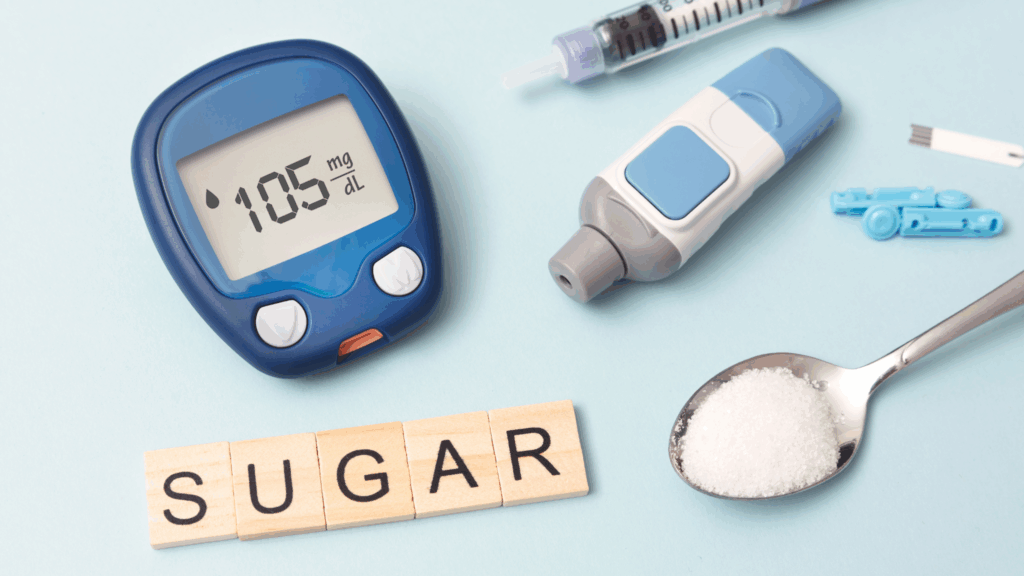Every November, we recognize National Diabetes Month as a reminder that diabetes affects far more than blood sugar. It impacts the entire body, including your teeth and gums. At Health Centered Dentistry in Anchorage, we believe a healthy mouth supports a healthy body.
For those living with diabetes, or at risk, it is important to understand how blood sugar control and oral health are closely connected. In this blog, we explain how diabetes influences your mouth, share insights from real patients, and provide practical tips to keep your smile strong while managing your health.
How Diabetes Affects Oral Health (The Science)
The Bi-Directional Link: Diabetes ↔ Gum Disease
One of the most consistent findings in dental research is that diabetes and periodontal (gum) disease influence each other. Poorly controlled diabetes increases your risk of gum disease, while untreated gum infection can make blood sugar harder to control.
This cycle occurs due to:
- A weakened immune response and slower healing
- Reduced blood flow and nutrient delivery to gum tissue
- Increased inflammation that worsens insulin resistance
As an example, a 14-year follow-up case of a patient with type 2 diabetes and severe periodontitis showed how chronic uncontrolled periodontal disease and uncontrolled diabetes feed into one another over time.
Oral Manifestations of Diabetes
People with diabetes are more prone to many oral issues:
- Dry Mouth (Xerostomia): Reduced saliva flow is common and correlates with poor glycemic control.
- Cavities and root decay: Because saliva helps buffer acids and remineralize enamel, reduced salivary protection raises decay risk.
- Oral infections & candidiasis (yeast infections): Elevated glucose in saliva provides more food for pathogenic species.
- Burning or sore mouth, altered taste, and tongue lesions are more frequently observed in diabetics than in non-diabetics.
- Delayed healing and increased risk of complications: After dental procedures or even minor trauma, healing may be slower, and the risk of infection is higher.
Additionally, one study showed that oral lesions like coated or fissured tongues appeared in 38% of people with Type 2 diabetes, compared to 25% of non-diabetic individuals.
Quality of Life & Systemic Impact
Poor oral health in diabetics is not just a “dental problem.” It can lead to pain, difficulty eating, swallowing comfort, and social discomfort. Moreover, some research suggests that extractions or reducing chronic oral infection load can reduce insulin requirements in patients with severe insulin resistance.
In other words, treating oral disease may help with diabetes management, making the mouth a partner in your metabolic care.
What Real Patients Are Saying
People living with diabetes often express confusion about the oral connection.
From r/diabetes_t1:
“My dental health is pretty good. No new cavities, gum disease, etc. I brush twice a day for 2 minutes & floss.” Reddit
“My dentist always says diabetes isn’t very correlated with poor oral health. My logic would dictate otherwise…” Reddit
These comments reflect confusion: some patients feel their dentists downplay the diabetes-oral link, while others diligently maintain hygiene and succeed. We believe in acknowledging the risk but empowering you with prevention.
Another from r/DentalHygiene:
“Diabetic with A1c over 7.0 needs deep clean but can’t afford it…” Reddit
At Health Centered Dentistry, we understand these concerns. Our goal is to empower you with information, prevention, and accessible care, especially during National Diabetes Month.
What You Can Do Right Now: Dental Tips for People with Diabetes
- Maintain Blood Sugar Control
Stable glucose levels help protect your gums and improve healing. Keep your dental and medical teams in communication. - Stay Consistent with Oral Hygiene
- Brush twice daily with fluoride toothpaste
- Floss or use interdental tools
- Use fluoride or antimicrobial rinses as advised
- Manage Dry Mouth
- Sip water frequently
- Chew sugar-free gum
- Use saliva substitutes or moisturizing rinses
- Avoid alcohol-based mouthwashes
- Don’t Skip Dental Visits
See your dentist every six months or more often if you have gum disease or a higher risk. Routine cleanings and early detection make a major difference. - Share Your Health Information
Tell your dentist your diabetes type, medications, and latest A1c. This helps us plan safe, effective appointments around your needs. - Act Quickly on Problems
Bleeding gums, soreness, or delayed healing should not be ignored. Early treatment prevents complications and protects long-term oral health.
In one published case, a patient with Type I diabetes and an acute endo-periodontal lesion achieved recovery through coordinated endodontic and periodontal treatment.
Another case showed that a patient with diabetes and xerostomia had repeated caries and denture problems tied to persistent dryness.
How Health Centered Dentistry Supports Patients with Diabetes
At Health Centered Dentistry, we are dedicated to whole body care and understand how oral and systemic health are connected. Here’s how we help:
- Holistic screening: Reviewing medical history, A1c levels, and oral risk factors.
- Customized care plans: More frequent cleanings and targeted gum therapy as needed.
- Gentle periodontal therapy: When necessary, we perform scaling and root planing (deep cleaning) with extra care to minimize infection risk.
- Education and prevention: Helping you manage dry mouth, select the right products, and improve home care habits.
- Safe procedures: Planning around your medication schedule and ensuring steady blood sugar during visits.
Final Thoughts: This National Diabetes Month, Protect Your Smile & Your Health
Diabetes and oral health are deeply connected, and caring for one supports the other.
This National Diabetes Month, take time to:
- Refresh your brushing and flossing habits
- Schedule your next dental checkup
- Talk to your medical team about your oral health
- Address early signs like bleeding gums or dry mouth
If you are living with diabetes or at risk, we would love to partner with you to create a personalized oral health plan. Call Health Centered Dentistry in Anchorage, AK, to schedule your visit and take the next step toward a healthier smile and healthier you.


